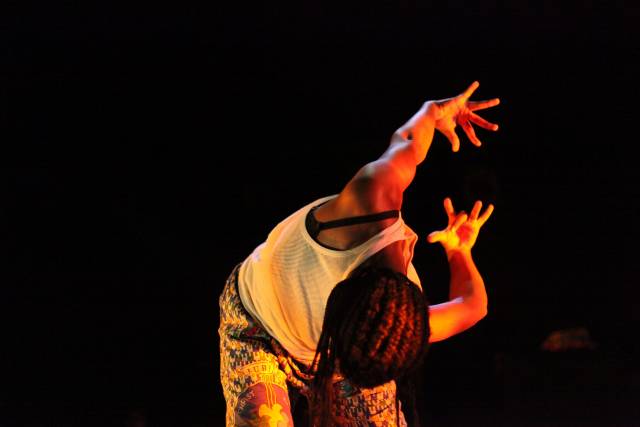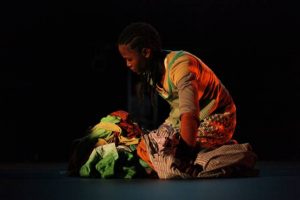

Radio inherently has a peculiar character among modes of communication in that it can be at once deeply intimate and small, but also highly communal and far-reaching. One or two individuals with the right equipment in a little room can broadcast across long distances into the ether and a plethora of people with radios far removed can receive the broadcast messages in whatever form they may assume, transmitted by the radioactive waves upon which they ride.
Of the radio program called Samedi Détente Dorothée Munyaneza says, “It was the main event of the week. We danced, we sang, we memorized the songs.” This is from singer, dancer, actor and choreographer Munyaneza’s stirring choreographic debut which is named after that radio program, Samedi Détente, which in English means ‘Saturday relief.’ Munyaneza’s play, a mixture of storytelling, song, and dance, recalls how American and French popular culture came through on the airwaves to her home in Rwanda up until the time that she was twelve. She was twelve years of age in 1994. On the 6th of April 1994 forces of darkness flooded Rwanda when President Juvenal Habyalimana’s plane was shot down as it approached the Rwandan airport in Kigali. Habylimana, a Hutu, had been holding a series of peace talks with Tutsi rebels in attempts to resolve longstanding ethnic conflicts intensified by colonialization in Rwanda, but almost immediately upon his death the Hutus began the genocidal slaughter of the Tutsis and Rwanda was bathed in blood as 800,000 Tutsis were butchered in roughly 100 days.
In Samedi Détente Munyaneza leads those who watch and listen through her memories of surviving the horror that was the Rwandan massacre. She expresses an ambivalent childhood relationship to what the radio program Samedi Détente represented; while on the one hand it fueled happy childhood fantasies, once the reality of evil exposed itself to her, all that fell apart as illusion. She recalls the children playing out Hollywood action movie games of the imagination as the adults pierced through the dream and told the children of the bad omens that they were upholding. The grim irony is that outside of Rwanda other nations turned their heads and maintained fantasies of their own.

Against this, in her play, Munyaneza becomes an antenna of sorts, a conduit through which it seems at times ghosts are speaking; the very personal ghosts of her life and also the ghosts of a largely neglected history. It is the flip side of the radio program of her childhood. Incorporating the dynamism of Zouglou dance and music, a style started by students in Ivory Coast to convey political and social realities, Munyaneza and her cohorts, the Ivorian dancer Nadia Beugré and the French musician Alain Mahé, create a performance that is, like radio, at once personally intimate and internationally expansive.
Much of the play is Munyaneza standing or sitting mesmerizingly still, telling the story through spoken words, often listing names or things destroyed in a biblical rhythm, but frequently in the telling words begin to break down and cannot convey fully the emotional scope of her experience. That is when music and dance take over, and take over they do. Munyaneza seems almost possessed at times as she dances in a semblance of a wrestling match with evil spirits and sings in a voice that is as haunting as wind though leafless trees at night. Beugré brings an accompanying energy representative of a barely restrained social consciousness to combat the violent injustice of the world. Mahé keeps the beats flowing across the stage to fuel the dance.
It is a dance of catharsis. The darkness and pain of Munyaneza’s tale is immense, almost overwhelming, and it ends with a catastrophe seemingly wrought by the indifference of existence. But an alchemical process attends the catharsis. Through the very act of turning the pain into art, the sorrow into song and dance and story, Munyaneza transmutes, as do the blues, the badness into steppingstones towards a kind of grace. Like a comforting voice emerging through the middle channels on a radio dial in the bleakest hours of night, Munyaneza’s Samedi Détente forms a blossom of hope amidst a garden sown with despair.